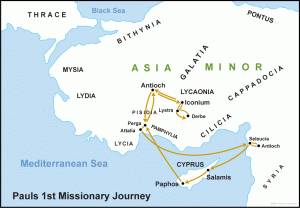
Acts 13:1-4
In Acts 13, we find Saul in Antioch in Syria, the church in Antioch is the first place that the followers of Jesus were called Christians. We must remember that this was not considered a compliment in the first century. The church was growing rapidly in Antioch, and the Apostles in Jerusalem sent Barnabas to them in order to help them. Acts 11:24 reveals a great deal about this man called Barnabas, “for he was a good man, full of the Holy Spirit and of faith. And a great many people were added to the Lord.”
We tend to think of Barnabas as the guy that was also on stage but never had a real part to play. But the truth is that Barnabas had a significant influence in the explosion of the early church. He was happy to be behind the scenes, but always made things happen. Why? Because he was full of the Holy Spirit and Faith. We need more people like Barnabas. Everyone wants to be the Paul, on stage being bold and declaring the Gospel, but if it wasn’t for the people like Barnabas, very little would actually get done.
In chapter 11:25, we read that Barnabas sees a need in the church in Antioch and he remembers Saul, he is led by the Holy Spirit to go to Tarsus and looks for Saul and when he finds him he takes him back with him to Antioch in Syria.

This is the beginning of Paul’s first missionary journey. As you can see on the map, he and Barnabas go from Antioch to Cyprus in the Mediterranean and then up to Perga and then up to Antioch in the province of Pisidia. This is not the same Antioch as you can see.
This young church in Antioch, a growing, vibrant and healthy church, was meeting together, and the Holy Spirit told them to commission these missionaries as we read in verse 2: “While they were worshiping the Lord and fasting, the Holy Spirit said, “Set apart for me Barnabas and Saul for the work to which I have called them.”
A few significant things to note here; firstly, they were worshipping and fasting. There are many reasons to fast, one of the most important reasons to fast is when we are facing a big decision. We fast, depleting our bodies of strength, relying on the Holy Spirit to give us strength and to speak to us.
Secondly, these were the first missionaries sent out. We tend to think that this was a common thing at that time, but actually it wasn’t. The church spread as people went about their daily lives, as they travelled for business as slaves were traded and moved around, that is how the Gospel message was spread. No-one really thought of being sent out as missionaries. We all know the great commission that Jesus left his disciples in Matthew 28, but for the most part, up until now, the disciples were still in Jerusalem.
The Holy Spirit began the mission’s movement by sending Barnabas and Paul west and north into modern day western Turkey.
The Holy Spirit must be the driving force of missions, we can have all the good intentions, but unless we are led by the spirit and empowered by the spirit, we are just going on a tour of the land.
The mission team we are sending to Cincinnati needs your prayers, that is why we prayed for them today. To go under the power of the Holy Spirit, to hear the Word of the Lord for the people of Cincinnati.
Paul finally arrives in Antioch in Pisidia and on the Sabbath day, they went into the Synagogue and sat down, the early church was worshipping on the first day of the week, Sunday, because of the resurrection. But this was a Jewish Synagogue, Paul and Barnabas went on Saturday as the Jewish tradition, they respected the culture they were visiting, which is another very important piece of missions.
In the Synagogue, traditionally they read the law and the Prophets, the Old Testament, as we know today. And then the leaders of the synagogue turned to these men from the other Antioch and asked them a loaded question, “After the reading from the Law and the Prophets, the rulers of the synagogue sent a message to them, saying, “Brothers, if you have any word of encouragement for the people, say it.” Acts 13:15
I doubt that the leaders in the Synagogue had any idea what Paul was about to say. Paul preached a sermon that day, taking them through the Law of Moses, the ancient history, and then introduced them to Jesus Christ, the Messiah, the risen Son of God.
This sermon is recorded for us in Acts 13 and this is still the message we declare today. This is the Good News, the Gospel message. This Is all we have, this message is still the only message that transforms lives, the only message that brings light into dark places. And as we go to Cincinnati next week, this is the message that we will be carrying in our hearts for the people of that city. There is power in the message, in verse 44 we read, “The next Sabbath almost the whole city gathered to hear the word of the Lord”
Antioch was turned upside-down by the power of the Word of God. Pray with us that this same message turns Kansas City and Cincinnati upside-down for the glory of God.

